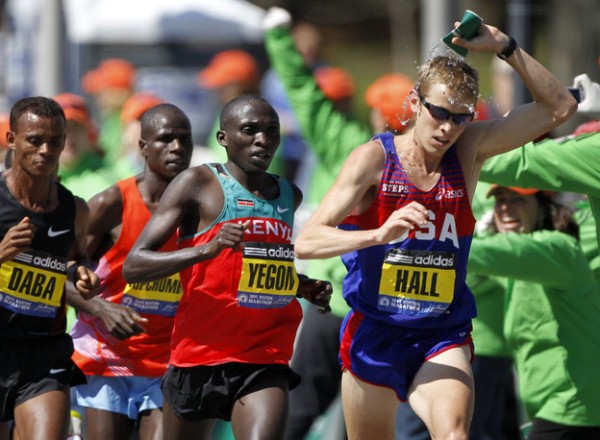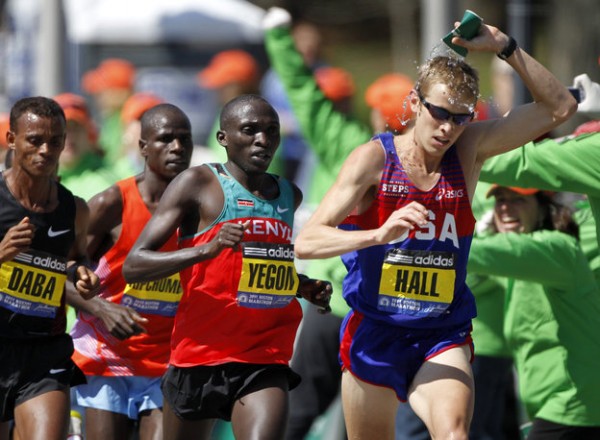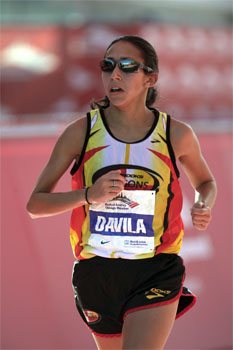
1 Corinthians 9:24
Do you not know that in a race all the runners run, but only one gets the prize? Run in such a way as to get the prize.
Yesterday I had the chance to watch two events that taught me the importance of one truth. First, let’s talk about what I saw and then we’ll dissect what I learned.
What I saw – Part 1
Yesterday was Patriots’ Day, and anyone who knows anything about running knows that means the running of the Boston Marathon. Since it is pretty much the gold standard of marathon running, it’s the one time a year that I fork out money to watch a television broadcast on my computer. It’s also the one day a year that is my least productive, because until I’m fast enough to qualify to run Boston, I have to run it vicariously through people I know. This is done by text alerts and through online runner tracking, and while technology is amazing, the constant texts and page refreshes do make it hard to accomplish any real work.
So I’m sitting at my desk doing some creative work (creative license is a lot like poetic license in that you can do just about anything and still call it part of the work you’re not doing!) and the beeps are sounding on my phone while Al Trautwig and Larry Rawson give me the play by play of the race on my laptop, and for most of the men’s race Ryan Hall is leading and looking strong. Only down side to the race is that there isn’t an American woman anywhere near the front of the women’s race because Kara Goucher is still coming back from childbirth and isn’t as competitive as she usually is.
Just as I gave up hope of an American woman winning, I hear the distinctive Trautwig voice ask, “What’s this? A newcomer to the women’s lead pack?” I check the monitor and see little-known
Desiree Davila running with and – perhaps more shocking – staying with two other Kenyan runners. They ran together for the final 10k and about a mile from the finish it became a two-woman race between Davila and Caroline Kilel. As they rounded the curve toward the end, Davila surged ahead only to find that Kilel answered and pushed a bit ahead coming down the final stretch. The B99 and I groaned as we watched the American’s hopes fading, but when Davila found the strength for one final pass, were suddenly screaming, high-fiving and three-throwing each other! Sadly, it was short-lived, and Kilel had the last surge and went on to win by 2 seconds over Davila. 2 seconds.
That’s how long it takes Apple to sell an iPad. 2 seconds.
If I had lost that race by 2 seconds, I’d have beaten myself senseless thinking about how close I’d come (of course, in this scenario I’d be a woman and that’s a little awkward), but Davila was all smiles recalling the race later. “It was the most excitement I’ve had in a race ever and just really carried me the last six miles,” Davila said. “I felt that energy, and I felt comfortable at the front and pushing the pace because of that. It really just carried me through to the finish line.”
While I was digesting how close our new-found hero had come to winning the Boston Marathon, I saw that the coverage had shifted to the men, and Ryan Hall was nowhere in sight. He had fallen out of contention, according to Trautwig, and I realized that the American draught at Boston was going to grow to 25 years. Hall, though, was upbeat in his post-race interview, and why shouldn’t he have been? He’d just run the fastest American marathon ever and finished 4th in the Boston Marathon. “I was out there running, and I was thinking to myself, ‘I can’t believe this is happening right now. I’m running a 2:04 pace, and I can’t even see the leaders.’ It was unreal.”
2 Americans, 2 amazing races, 2 losers, 0 winners, 0 regrets, and 0 whining.
What I saw – Part 2
My children attend Park Ridge Christian School and this year is the inaugural season for the middle school girls’ volleyball team. I had attended one other match before yesterday and had seen them lose the best of five series after taking the first 2 games. Yesterday’s match was the first round of the conference tournament and possibly the last home match, so when they won the first game handily, the crowd was alive. Well, the left side was because that’s the side that really got into the wave that I started during the time-outs.
 At any rate, the electricity quickly left as the team from North Hills won the next 2 games, and the tension was palpable when Park Ridge found themselves down 19-24 in the 4th game of the match. Their season hung by a thread, one point from being over, and then, something magical happened. Amazingly, with dig after dig and incredible serves and returns, they fought back and eventually won that fourth game. The crowd exploded! Some people on the right side even threw their hands up in some sort of mini-wave, and then it all came down to the deciding 5th game.
At any rate, the electricity quickly left as the team from North Hills won the next 2 games, and the tension was palpable when Park Ridge found themselves down 19-24 in the 4th game of the match. Their season hung by a thread, one point from being over, and then, something magical happened. Amazingly, with dig after dig and incredible serves and returns, they fought back and eventually won that fourth game. The crowd exploded! Some people on the right side even threw their hands up in some sort of mini-wave, and then it all came down to the deciding 5th game.
I’m not exactly sure, but I don’t think either team ever led by more than 2 or 3 points in that game. We would gain the momentum, then North Hills would rally. They would run off a few points and we would answer with some insane shot that would seemingly suspend in mid-air before hitting off the top of the net and falling on the North Hills side. All the while the crowd would get loud, then quiet, then turn blue from holding their collective breath, afraid to exhale for fear that it might cause a missed shot. And then, with a simple flick of Rachel Poston’s hand, we had won.
And they had lost.
2 teams, 5 amazing games, 1 winner, 1 loser, 0 regrets.
What I learned
There’s a big difference between disappointment and regret, and most of us don’t see it. We watch these professional athletes or 2 middle school girls’ volleyball teams compete and when it’s over, we think about how much we would regret it if we were on the losing side. We wonder how they’re able to sleep at night when they had gotten so close and yet came up a little short, and the words Paul wrote in 1 Corinthians make it clear: win or lose, there is no regret when we have given it all.
Everyone of the 25,000+ runners in the Boston Marathon were in one of 2 categories at the end of the day. They had either won (met or exceeded their race goals) or lost (come up short). The ones in the latter category found themselves in one of 2 additional groups: the disappointed or the regretful. That dividing has nothing to do with outcome and everything to do with output. Run strong with everything you’ve got, and the result is secondary because you can walk away knowing that, as Paul wrote, you ran “in such a way as to win the prize.”
Regret is like a bad movie you can’t stop watching.
I’m sure you’ve done it before, too. You find yourself on the couch late at night knowing you need to go to bed but glued to a really disastrous B movie (or worse, a C or Z movie). Despite knowing your energy level will suck the next day, you just can’t pull away. You can’t stop watching the train wreck. (Ironically, marketers today have found a way to use this principle very successfully. Case in point? The success of this video or anything by Justin Beiber.)
What I do know is that there would have been a lot of bad footage playing in the minds of the Park Ridge volleyball team if they had lost that 4th game. Not because they would have lost (outcome), but because they would have lost knowing they hadn’t played their best (output), and when we don’t do everything possible to put our best out there, the “what if” footage starts rolling the second the horn sounds or the tape breaks at the finish line.
So don’t just run; don’t just dig, set, and spike.
“Run in such a way as to get the prize.”
Do that, and not only will you never know the sting of regret, but you’ll never see failure stop you from giving it another shot next time.








Leave a Comment